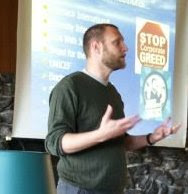The Work of the Day
It is interesting, first of all, that Jesus should say that neither the blind man nor his parents sinned. I am assuming that implied is "that he was born blind," because the liklihood of three people living sinlessly is pretty low - even lower that Jesus wouldn't find such examples worth commenting further on. But there is hope here, too, that we might be genuinely capable of living without sin in certain contexts - on our best behavior, if you will. Or, even if we can't live without sin, one aspect of the Grace of God is God's willingness to overlook or forgive sin - particularly sin in spite of our best intentions or actions.
Notice, though, that Jesus does not dwell on the issue of sin. A short, dismissive answer to the disciples saying in other words that sin isn't the concern here, and Jesus zeroes in on the real issue: "As long as it is day, we must to the work of him who sent me." (NIV) All this talk of sin and deserving is a distraction - the real issue is for us to be at God's work while we are able.
For Jesus, the work of God is healing those blind without fault - in other words, healing injustice and relieving suffering. It isn't so much that Jesus is a miracle-worker - there were plenty of miracle-workers across the Roman Empire. Even for the Gospel writer John the miraculous plays second-fiddle to the purpose and commentary of Jesus surrounding his works, what we are supposed to learn from the story or walk away from this reading believing.
We must do the work of that which sends us. The nature of our God is revealed by our actions. Even if we Christians sing devotedly one hour a week but live the rest of our lives as if that one hour meant nothing, then we reveal our personal god to be shallow, untransformative, soothing for us but insensitive to the cruelties of the world, and unable to move us to action and sacrifice on others' behalf.
We must do the work of that which sends us. If our God is one that has the power to move mountains or redeem sinners or make us want to do things that do not serve our own interests or pleasures, then where are we in relation to that power? If we believe that God can - and have every expectation that God will - be active in the world, in the hearts and minds of people; or that God can and does work in our world to end injustice, transform people, redeem individuals and societies, use every opportunity to transform what is to what should be, then why are we not just as actively engaged?
Night is coming! When no one can work! We have only so much time, people! We do not live forever. Our work for good or ill will not survive forever. The structures and mechanisms - governments, laws, cultures, economic systems, personal relationships - they will not last forever. We have to get to work in them now, before we have lost our chance. (Even then, though, we'll have the chance to work in our new situation - there is Grace even in our failure to act.)
Night is coming - the sun will set on opportunities before long. You will pass someone on the street needing to be reached out to. You will pass the opportunity to give your money to places where it is being put to the work of God. You will not stop from being angry, when gentleness and patience would be better called for. You will lose a friendship to time or distance. You will spend your money on silly things. You will move homes, change neighbors, change jobs and co-workers. Night is coming! Things will change - and you will have lost the opportunity to do the work of that which drives us.
Where are you in your day? What opportunities are at hand for you?
God cares deeply for us and for our world. Where Marxism and Capitalism fail - believing that people are merely products of their environment on the one hand, and that people's environment is a commodity to be purchased or crafted without regard to their spiritual condition - Jesus succeeds: the world is transformed and redeemed by the transformation and redemption of individuals, who then build a new world within the old, seed communities of Zion.
While it is yet day, what seeds are we planting?
Labels: Community, Economics, Gospel of John, Way of the Cross (Discipleship)



0 Comments:
Post a Comment
<< Home